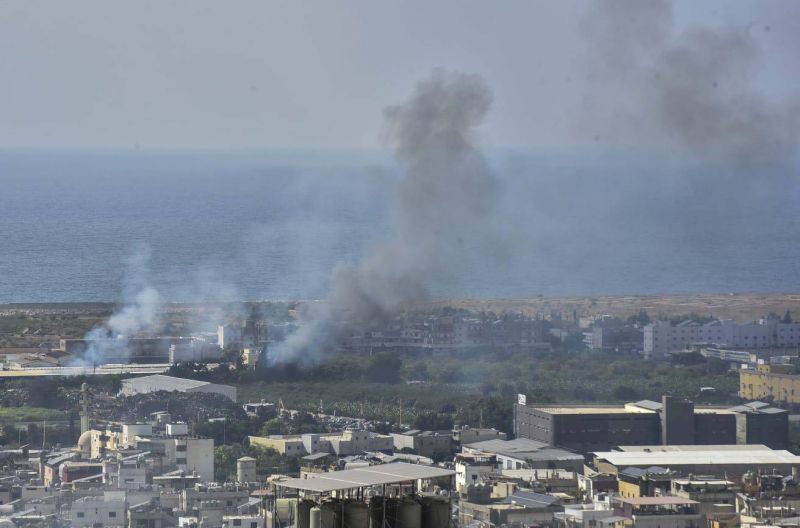
Smoke rises during deadly clashes in the Ain al-Hilweh camp just outside Saida on Sept. 10, 2023. (Credit: Muhammad Yassin/L'Orient Today)
Want to get the Morning Brief by email? Click here to sign up.
An uneasy calm — with some intermittent gunfire — held in the Ain al-Hilweh camp overnight and into this morning following a ceasefire which halted several days of clashes between Fatah and Islamist factions that killed at least 11 people. Among the injured were civilians struck by stray bullets. Azzam al-Ahmad, a member of Fatah’s Central Committee, also landed in Beirut last night ahead of negotiations to bring a solution to the violence, according to the state-run National News Agency. The fighting displaced hundreds of the camp’s residents since Thursday and left more than 100 people injured, including several Lebanese Army soldiers at a nearby barracks, according to medical sources and the head of the Palestinian Red Crescent Riad Abou al-Inen. Yesterday afternoon, General Security called for a ceasefire after a meeting joining the institution’s chief, Gen. Elias Baissari, and the Palestinian Join Action Authority. The fighting is reportedly linked to Islamists’ refusal to turn in the alleged killers of a Fatah official, whose slaying led to days of deadly clashes in late June. In March, the withholding of alleged assassination suspects led to armed clashes in the camp.
The Lebanese Embassy in Morocco is holding a blood drive today to aid the victims of the 6.8-magnitude earthquake that struck the country Friday, killing at least 2,700 people, injuring more than 2,500 and leveling entire villages. No deaths or injuries were recorded among Lebanese citizens though some reported to the embassy that their houses were partially damaged, Lebanese Ambassador to Morocco Ziad Atallah told L’Orient Today. Atallah called on the Lebanese to reciprocate the support Morocco showed after the Aug. 4, 2020 Beirut port explosion, after which the country dispatched 22 military planes boarded with doctors and medical supplies, and erected a field hospital that tended to injured people. The Friday earthquake is the deadliest Morocco has experienced since the 1960 quake that destroyed Agadir, killing 12,000 people, about a third of the city’s population at the time. In February, Lebanese first responders were dispatched to Turkey to aid relief efforts in the wake of a 7.8-magnitude earthquake that killed more than 50,000 people.
United Nations High Commissioner for Human Rights Volker Turk called for an "international fact-finding mission to look into human rights violations" related to the Aug. 4, 2020 Beirut port blast. Blast victims' relatives last month said that around 70 MPs signed a petition calling on the UN to conduct an independent investigation. In March, Australia presented a petition to the Human Rights Council to establish an independent fact-finding mission. The same month, hundreds of people commemorated the third anniversary of the tragedy that killed at least 220 people, injured more than 6,500 and destroyed swathes of the capital. The investigation into the incident remains suspended and awaits rulings on complaints filed against lead investigator Judge Tarek Bitar, the most recent of which came after he attempted to resume the probe in January despite lawsuits. Additionally, dismissal requests against Bitar cannot be resolved until judicial vacancies are filled.
French diplomat Jean-Yves Le Drian returned to Beirut yesterday for the third time since his appointment as Special Envoy to Lebanon in June. During his last visit, Le Drian stated his intention to hold dialogue with various political parties, to be followed by consecutive election sessions in Parliament. His initiative, however, sparked controversy among certain political parties. Parliament Speaker Nabih Berri’s call for a dialogue between political parties was also met with the criticism of certain parties. A dozen unsuccessful electoral sessions have taken place since the start of the electoral period, two months before the end of former President Michel Aoun’s term on Oct. 31. The vacuum continues to cause controversy around the issues of the caretaker cabinet’s ability to meet, Parliament’s ability to legislate, and the government’s ability to appoint officials to certain top posts.
In case you missed it, here’s our must-read story from yesterday: "The muffled sounds of Lebanon’s collapse"
Compiled by Abbas Mahfouz